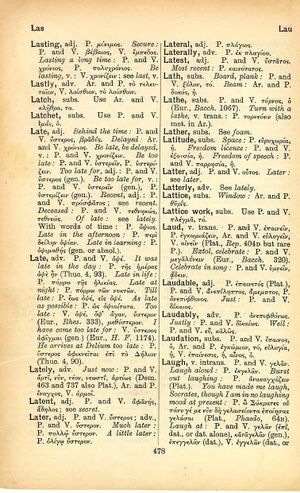late
Τὸ νικᾶν αὐτὸν αὑτὸν πασῶν νικῶν πρώτη τε καὶ ἀρίστη. Τὸ δὲ ἡττᾶσθαι αὐτὸν ὑφ' ἑαυτοῦ πάντων αἴσχιστόν τε ἅμα καὶ κάκιστον. → Τo conquer yourself is the first and best victory of all, while to be conquered by yourself is of all the most shameful as well as evil
English > Greek (Woodhouse)
adj.
Behind the time: P. and V. ὕστερος, βραδύς. Delayed: Ar. and V. χρόνιος. Be late, be delayed, v.; P. and V. χρονίζειν. Be too late: P. and V. ὑστερεῖν, P. ὑστερίζειν. Too late for, adj.: P. and V. ὕστερος (gen.). Be too late for, v.: P. and V. ὑστερεῖν (gen.), P. ὑστερίζειν (gen.). Recent, adj.: P. and V. πρόσφατος; see recent. Deceased: P. and V. τεθνηκώς, τεθνεώς. Of late: see lately. With words of time: P. ὄψιος. Late in the afternoon: P. περὶ δείλην ὀψίαν. Late in learning: P. ὀψιμαθής (gen. or absol.). adv. P. and V. ὀψέ. It was late in the day: P. τῆς ἡμέρας ὀψὲ ἦν (Thuc. 4, 93). Late in life: P. πόρρω τῆς ἡλικίας. Late at night: P. πόρρω τῶν νυκτῶν. Till late: P. ἕως ὀψέ, εἰς ὀψέ. As late us possible: P. ὠς ὀψιαίτατα. Too late: V. ὀψέ, ὄψʼ ἄγαν, ὕστερον (Eur., Rhes. 333), μεθύστερον. I have come too late for: V. ὕστερος ἀφῖγμαι (gen.) (Eur., H.F. 1174). He arrives at Delium too late: P. ὕστερος ἀφικνεῖται ἐπὶ τὸ Δήλιον (Thuc. 4, 90).

